Plot
Sapna (Sharmila Tagore), flying back to India from the USA is involved in an airplane engine "flameout". She loves poetry, in particular the work of a poet called Ujjwala. Unable to distinguish between the poet and the poetry, she sets out on a journey to meet the poet in a place called Phulwari. Sapna believes that Ujjwala is her dream man.
Her wealthy father, worried by her distraction consults a psychiatrist who pronounces that Sapna needs treatment and must be sent to his clinic for an extended period of time. Running away from home, in a beautiful red MG TF (probably a 1954 model) she comes across Sunil (Shashi Kapoor) working on his Jeep (one of the early right-hand drive versions that Mahindras produced).
A couple of accidents later they find themselves in a luxurious Mercedes Benz tour coach (possibly an O 321 H - with a rear engine) and their journey of exploration begins. Faced with obstacles, raised by greedy people who want to get the informant's reward announced by Sapna's father Randhir Singh Chauhan; and going through some comic as well as dangerous interludes the screen couple arrive at the climax on their way to Phulwari. Sunil is doing his best to escort Sapna to Phulwari.
How Sapna reconciles her love for Ujjwala, who she has only met through his poetry and Sunil's unreciprocated love for her makes for an interesting denouement.

Shashi Kapoor was an Indian actor and film producer who is best known for his works in Hindi films. A recipient of several accolades, including four National Film Awards and two Filmfare Awards, he also featured in a number of English-language international films, particularly films produced by Merchant Ivory. The Government of India honoured him with the Padma Bhushan in 2011, and the Dadasaheb Phalke Award, in 2014, for his contribution to Indian cinema.

Sharmila Tagore is an Indian actress primarily known for her work in Hindi and Bengali films. Regarded as one of Indian cinema's most accomplished actresses, Tagore is a recipient of two National Film Awards, a Filmfare Award, a Filmfare OTT Award and the Filmfare Lifetime Achievement Award for her contributions to Hindi cinema. In 2013, the Government of India, honoured her with Padma Bhushan, India's third highest civilian honour for her contributions to the Indian culture through performing arts.
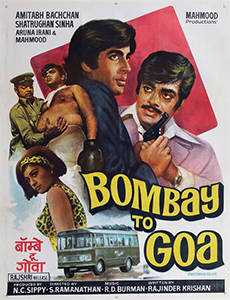
Bombay to Goa is a 1972 Indian Hindi-language road comedy film directed by S. Ramanathan and produced by Mehmood and N. C. Sippy. Released in India on 3 March 1972, the film stars Amitabh Bachchan, Aruna Irani, Shatrughan Sinha, Nazir Hussain, Mehmood and Anwar Ali in lead roles. The film is known particularly for its catchy tunes and was a "superhit" at the box office. The film is a remake of a 1966 hit Tamil film Madras to Pondicherry and was remade in Marathi in 2004 as Navra Maza Navsachaand Kannada in 2007 as Ekadantha. The Hindu had reported that Rajiv Gandhi was offered the lead role by Mehmood but he had turned it down.

The Kapoor family is a prominent Indian show business family with at least 4 generations of the family over 94 years being active in the Hindi film industry. Numerous members of the family, both biological and those who have married into the family, have had prolific careers as actors, film directors and producers. "The Pioneer" founder of the dynasty was "The Patriarch", Prithviraj Kapoor, who was the first member of family to begin acting in movies with his 1929 debut film Be Dhari Talwar. He was a pioneer of Indian theatre and the founding member of Indian People's Theatre Association (IPTA). His son Raj Kapoor was the most influential actor and director in Hindi cinema. The genesis generation or the earliest linear generation of the Kapoor family tree to ever act in the films was Prithviraj Kapoor's father, Basheshwarnath Kapoor, who debuted as actor in 1951 film Awaara, which was produced, directed and starred in lead role by his grandson Raj Kapoor.

Waqt is a 1965 Indian Hindi-language Bollywood drama film directed by Yash Chopra, produced by B. R. Chopra and written by Akhtar Mirza and Akhtar-Ul-Iman. It was included in the British Film Institute's long list of films in consideration for its top ten of Indian films award. Released in India on 30 July 1965, the film stars an ensemble cast of Sunil Dutt, Raaj Kumar, Shashi Kapoor, Sadhana Shivdasani, Sharmila Tagore, Balraj Sahni, Achala Sachdev, Rehman and Madan Puri. It pioneered the concept of Hindi films with multiple stars.
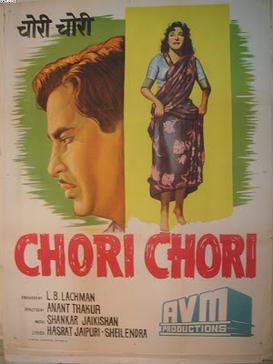
Chori Chori is a 1956 Indian Hindi-language romantic comedy film directed by Anant Thakur. It stars Raj Kapoor, Nargis in lead roles. Pran, Johnny Walker, Gope, David, Mukri, Bhagwan Dada have character parts. It is an adaptation of the 1934 American film It Happened One Night. This was the last film of Nargis and Kapoor together as leads, with Nargis doing one cameo appearance in the Kapoor starrer Jagte Raho (1956).
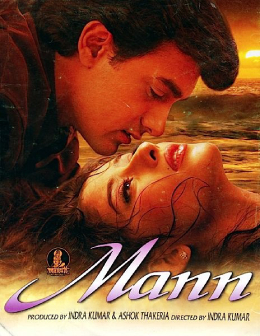
Mann is a 1999 Indian Hindi-language romantic drama film written and directed by Indra Kumar. The film starred Aamir Khan and Manisha Koirala, pairing them for the second time, and also features Anil Kapoor, Sharmila Tagore and Neeraj Vora with Rani Mukerji in a special appearance. This is the second collaboration between Khan and Koirala since Akele Hum Akele Tum (1995). The film is mainly based on the 1957 American film An Affair To Remember. Mann received positive reviews upon release. Aamir Khan has admitted that he became dissatisfied with the film within a few days of shooting but completed it due to his commitment to Indra Kumar.
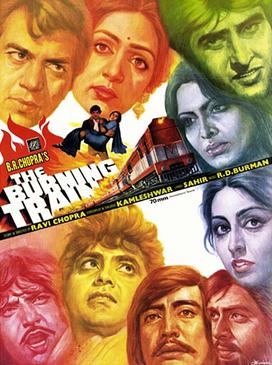
The Burning Train is a 1980 Indian Hindi-language action thriller and Disaster film produced by B.R Chopra and directed by Ravi Chopra.

Naseeb (transl. Destiny) is a 1981 Indian Hindi-language masala film produced and directed by Manmohan Desai, and written by Kader Khan. It is a typical Manmohan Desai film starring, Amitabh Bachchan, Shatrughan Sinha, Rishi Kapoor, Hema Malini, Reena Roy, Kim in lead roles and Pran, Prem Chopra, Shakti Kapoor, Kader Khan, Amjad Khan, Amrish Puri in supporting roles, along with Jeevan in a small positive role. The music is by the Manmohan Desai regulars Laxmikant–Pyarelal.

Daag: A Poem of Love (transl. smear) is a 1973 Indian Hindi-language romantic drama film produced and directed by Yash Chopra in his debut as a producer, which laid the foundation of Yash Raj Films. It is an adaptation of the 1886 Thomas Hardy novel The Mayor of Casterbridge. The film stars Rajesh Khanna, Sharmila Tagore and Raakhee in lead roles, with Madan Puri, Kader Khan, Prem Chopra and A. K. Hangal.

Aamne Samne is a 1967 Hindi mystery film produced and directed by Suraj Prakash. The film stars Shashi Kapoor, Sharmila Tagore, Prem Chopra, Rajindernath and Madan Puri. The film's music is by Kalyanji Anandji.
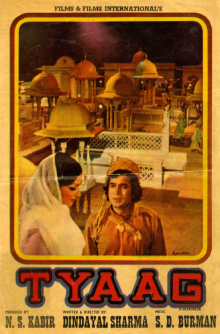
Tyaag (transl. Sacrifice) is a 1977 Bollywood film directed by Din Dayal Sharma. The film stars Rajesh Khanna and Sharmila Tagore in lead roles. The film was produced by Sharmila Tagore's secretary, N.S. Kabir, and was co-produced by Sharmila Tagore. Rajesh Khanna's real-life secretary Gurnam Singh played the side kick Bansi to Khanna's character Chetan in this film. The film was critically acclaimed and given four stars by critics upon its release in Bollywood Guide Collections. It was the last film to be released with the music director as S.D. Burman. This film was not commercially successful at the time of its release. However, over the years this film has gained a cult following and appreciation from audiences in its screening on television.

Griha Pravesh is a 1979 Indian Hindi-language drama film directed by Basu Bhattacharya. The film stars Sanjeev Kumar, Sharmila Tagore and Sarika. The film, about adultery, was the last of Basu Battacharya's introspective trilogy on marital discord and decay in an urban setting, which included Anubhav (1971), Avishkaar (1973).

Safar is a 1970 Indian Hindi romantic drama film produced by the Mushir-Riaz duo and directed by Asit Sen, based on a novel by Bengali writer Ashutosh Mukherjee. The film stars Ashok Kumar, Rajesh Khanna, Sharmila Tagore and Feroz Khan in lead roles. The film became the tenth top-grossing production of the year. It won one Filmfare Awards and four Bengal Film Journalists' Association Awards. Rajesh Khanna received a nomination for BFJA Awards for Best Actor (Hindi). Asit Sen remade the 1956 Bengali film Chalachal, which was directed by him, in Hindi as Safar (1970). As per review by critics, Safar was carried more than ably by Khanna's immense charm at the peak of his popularity. Rajesh Khanna beautifully conveys his character's desperation and his conviction that surviving by a slender thread is not really living. This film is counted among the 17 consecutive hit films of Rajesh Khanna between 1969 and 1971, by adding the two-hero films Maryada and Andaz to the 15 consecutive solo hits he gave from 1969 to 1971.

New Delhi Times is 1986 Hindi-language political thriller film directed by Ramesh Sharma and written by Gulzar, starring Shashi Kapoor, Sharmila Tagore, Om Puri and Kulbhushan Kharbanda in lead roles. The film is about a newspaper editor who exposes the politics-media corruption nexus.
Ek Mutthi Aasmaan is an Indian family drama television show. Neha Pandey was in charge of casting It aired on Zee TV. it was replaced by Bandhan.

Gehri Chot, also released as Door-Desh, is a 1983 Indian-Canadian Hindi-language crime-drama film directed by Ambrish Sangal, starring Shashi Kapoor and Sharmila Tagore in the lead roles with Raj Babbar, Parveen Babi, David Abraham, Nadeem Baig, and Bobita in supporting roles. This was both Pakistani actor Nadeem and Bangladeshi actress Bobita's only appearance in a Bollywood film. It was a Bangladesh–Indian joint production film. This was also the last time veteran actor David Abraham appeared in a movie, filmed shortly before his death in 1982.

Paap Aur Punya is a Bollywood drama film directed by Prayag Raj. The film stars Shashi Kapoor, Sharmila Tagore and Ajit. Shashi Kapoor also appears in dual role.
Hum To Chale Pardes is a Bollywood family-drama film released in 1988. The film was directed by Ravindra Peepat and written by Anees Bazmee. The musical score was done by Vijay Singh. Starring Rajiv Kapoor, Shashi Kapoor, Anju Mahendru, Mandakini, Kulbhushan Kharbanda in leading roles, the film explores a father's unfathomable love for his only daughter and the insensitivity of the mother-in-law to the motherless girl. Sharmila Tagore and Asha Parekh had given guest appearance in the film.















